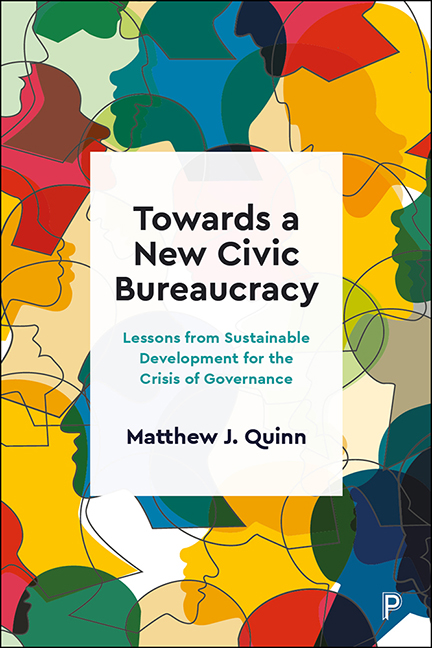Book contents
- Frontmatter
- Dedication
- Contents
- List of figures and tables
- Introduction
- 1 Framing the thinking
- 2 Governance and sustainable development as governmentality
- 3 Bureaucratic practice and governmentality
- 4 Lessons from governing for sustainable development
- 5 A new civic bureaucracy
- Closing words
- Appendices
- References
- Index
1 - Framing the thinking
Published online by Cambridge University Press: 15 September 2022
- Frontmatter
- Dedication
- Contents
- List of figures and tables
- Introduction
- 1 Framing the thinking
- 2 Governance and sustainable development as governmentality
- 3 Bureaucratic practice and governmentality
- 4 Lessons from governing for sustainable development
- 5 A new civic bureaucracy
- Closing words
- Appendices
- References
- Index
Summary
All general theories must, as theories, keep modestly in the background, not in open argument only, but even in our own minds.
Woodrow WilsonIntroduction
Academic and political approaches to sustainable development, governance and public administration reflect a diverse range of values and disciplinary lenses. This makes it nigh impossible to find a common theoretical frame for exploring the question of what lessons sustainable development governance has for bureaucracy. Any single framing risks ignoring important debates and viewpoints. Applying theory also risks the ire of the Anglo-Saxon distrust of theory, a distrust captured in Woodrow Wilson's opening quote to the chapter, but a lack of theory can be very unhelpful to consistency of approach and the ability to reflect. In preparing this book, however, I have been drawn to a set of writers on governance who seem to speak most clearly to the concerns I found in my bureaucratic practice.
Of the modern authors, I have focused on Michel Foucault's analyses of technologies of power and domination and on Phillip Pettit's presentation of the aim of civic republican governance as the minimization of domination over others. Pettit and Foucault appeal because they both recognize governance as a dynamic process and acknowledge the significance of the minutiae of process that are the stuff of bureaucracy, not just the grand political sweep.
I pair the modern voices with historic ones, notably Max Weber, with his interest, not so dissimilar from Foucault’s, in the controlling power of bureaucracy, and Woodrow Wilson, the academic 28th US president, with his sense of bureaucracy as a positive force for civic good. I have also been hugely in the debt of key writers on green governance and governance for sustainable development, particularly James Meadowcroft, whose article ‘Who's in charge here?’ (Meadowcroft, 2007) arguably remains the clearest exposition of the complex issues around governing for sustainable development, and John Dryzek who has been in the vanguard of thinking about dialogue and deliberative or discursive democracy as a pathway to realizing sustainable development (Dryzek, 2010).
- Type
- Chapter
- Information
- Towards a New Civic BureaucracyLessons from Sustainable Development for the Crisis of Governance, pp. 5 - 13Publisher: Bristol University PressPrint publication year: 2022



